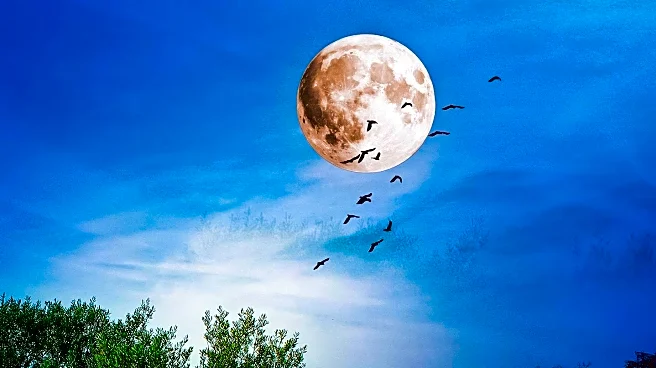What's Happening?
Washington, D.C. experienced a notably perfect summer day on Saturday, marked by a full moon that illuminated the early morning sky. The day was characterized by warm but not hot temperatures, clear blue skies, and a lack of humidity, creating an ideal meteorological condition. The high temperature reached 84 degrees, which is five degrees below the average for August 9, and significantly cooler than the record high of 102 degrees set 95 years ago. The morning low was 65 degrees, providing a refreshing start to the day. The full moon reached its peak at 3:55 a.m., offering a bright and unobstructed view in the southwestern sky, enhancing the day's natural beauty.
Why It's Important?
The perfect weather conditions in Washington, D.C. offer a respite from the typical summer heat and humidity, providing residents and visitors with an opportunity to enjoy outdoor activities comfortably. Such days can boost local tourism and encourage community events, benefiting local businesses and enhancing the quality of life. The full moon adds a unique aesthetic element, potentially increasing interest in astronomy and outdoor nighttime activities. This event highlights the importance of favorable weather patterns in urban settings, contributing to public well-being and economic activity.
What's Next?
While the perfect weather conditions are temporary, they may inspire local events or gatherings that capitalize on the pleasant atmosphere. Residents might take advantage of the cooler temperatures to engage in outdoor activities or explore the city. Meteorologists and local authorities may continue to monitor weather patterns to predict similar days, aiding in planning for community events. The full moon's visibility could encourage educational programs or public stargazing events, fostering community engagement and interest in astronomy.
Beyond the Headlines
The occurrence of a perfect summer day in Washington, D.C. underscores the variability of weather patterns and their impact on urban life. It raises questions about climate change and its effects on local weather conditions, prompting discussions on environmental sustainability. The full moon's presence may also evoke cultural and historical reflections, as lunar cycles have been significant in various traditions and practices. This event could lead to increased awareness of the natural world and its influence on human activities.








